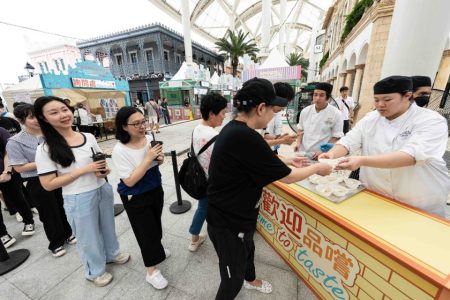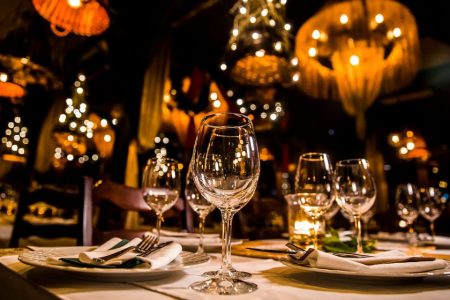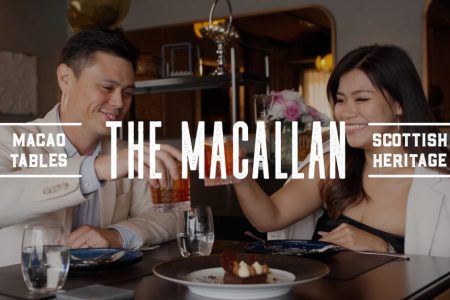Born and raised in Macao, Anthony Francis Sousa Tam was already well-known on the local F&B circuit as the founder of Japas, a popular restaurant serving Japanese food fused with Spanish-style tapas flair, and Root, a celebrated fusion concept sustained by Tam’s own in-house hydroponics system. Though today he’s based in Shanghai, helming one of the city’s most innovative culinary projects, this ambitious chef is still recognised by Macanese foodies as a local boy made good.
Tam’s passion for food started early on with simple kitchen experiments. “My first interest in cooking began when I was a young teenager,” says Tam. “I was never satisfied with a typical quick snack of noodles at home; I always found a way to make a tastier lunch for myself by adding vegetables, sauces and meat. This experimentation with flavours and ingredients set me up for a life of cooking.”
Of his Macanese mother who raised (and fed) him, Tam says that she is “an amazing cook.”
“She is at the heart of all our family gatherings, and always prepares plenty of traditional dishes for everyone to feast on.”
That early exposure to Macao’s gastronomy was a critical part of Tam’s creative journey. Today, he credits the city’s unique blend of cultural influences as having helped him to mould and shape his culinary style.
“The combination of Chinese and Portuguese cuisine that is so readily available in Macao has always had a strong influence on how I create a dish.”
To this day, Tam remains heavily influenced by Macanese cooking and food, evident in some of signature recipes. Take his polvo à lagareiro, made of thin slices of octopus, crispy puffed potatoes, and rich garlic olive oil, or his sea-inspired creamy lobster curry, with dehydrated cherry tomatoes. He developed both dishes in his current role as executive chef at the OCTAVE Institute, a privately owned company based in Shanghai which describes itself as, “a wellbeing platform fusing Eastern wisdom with Western medicine.”
In his role, Tam has had the opportunity to oversee new and innovative ventures, like the organic restaurant, Thought For Food. Hidden within the confines of a compound in Shanghai’s trendy French Concession district, Thought For Food specialises in natural, healthy and responsibly sourced cuisine. The concept is the flagship restaurant of the OCTAVE Institute’s The Living Room, billed as “the first comprehensive urban wellness centre created in China”, and represents a rare but slowly expanding niche in mainland Chinese F&B. Under his purview, Tam also heads up the kitchen at SANGHA Retreat, a Suzhou-based holistic wellness retreat.
Before he landed a job in Shanghai in his mid-forties, Tam had spent decades travelling the world. After graduating high school in Macao, he flew to the UK where he initially studied architecture at university. His passion for cooking never disappeared, however, and he was soon lured back into the kitchen.
“I started doing basic jobs in some Chinese restaurants in London,” he says. “In some of these restaurants, I was lucky to work my way up the chain. I eventually had the confidence to apply for more skilled positions in some of London’s best high-end restaurants.”
In truth, Tam’s employment history reads like a who’s who of London’s top dining establishments. First, he worked as a sous chef at Busaba – famous for its Thai salads, noodles, curries and a fanatical cult following. Next, he took on a role as a sous chef at celebrity favourite Nobu, before ascending to head chef at Tsunami, a famous modern Japanese eatery in London.
He spent time in highly divergent environments, from haute cuisine at Michelin Chinese restaurant Hakkasan in the city’s upscale West End, to stints working for a multinational at a pan-Asian food chain, an exclusive private member’s club, and finally, the part-owner of a Japanese restaurant in Nottingham.
“These places were all very much coming into their own when I worked for them,” says Tam of the now-renowned restaurants where he cut his teeth. “I like to think that I helped them build the base that helps them to live up to their reputation today.”

Experienced and enthusiastic
By 2008, Tam had amassed an incredible amount of experience. He had even cooked for British supermodel Kate Moss at her wedding. But it was time for him to explore new horizons, and by the end of the year, he departed for Baku, the capital city of Azerbaijan, to work as the executive chef of a restaurant nestled on the banks of the Caspian Sea.
“This was an exciting position for me, as the owners, staff and customers were so dedicated to it,” says Tam, of his time working in the Caucasus. “I’m happy to know that some of the classic dishes I created with the staff are still the top-sellers there so many years later.”
He also frequently cooked for the President of Azerbaijan, Ilham Aliyev, and his family during the four and a half years he resided in the country. “It was an honour,” he says. “The Azeri cuisine is as unique as Macanese cuisine. I gained so much experience and knowledge about this beautiful culture, which I often impress upon my style of cooking.”
After several more positions, which brought him to international metropoles like Amsterdam, Beirut and Copenhagen (with a brief stint back in Macao), Tam seems to have finally settled into a groove in Shanghai. In 2012, he landed the job of executive chef at The OCTAVE Institute and he’s been in the role ever since.
“It’s a health-driven concept that I have passionately built with the owners and creators,” he says. “Every day I enjoy the new and developing concepts that not only give myself, but also our customers a healthy way to live their lives. This is an amazing platform to be creative and realise my passion for healthy, sustainable food.”
Tam says that regardless of how much success he enjoys abroad, he still feels “much comfort” when he returns to Macao – not least because it’s where he can still find his favourite noodles at local eatery A Vencedora.
“I feel so proud and enthusiastic when I find a new place to eat in Macao,” he says. “We have a unique cuisine and a diverse culture – and that makes us distinctly passionate about our food.”
Anthony Sousa Tam has had a colourful career, spanning restaurants, countries and decades. What’s next for this intrepid culinary wanderer? “In the future, I hope to develop my interest in food as medicine,” he says. “I want to focus on cooking as sustainably as possible while, at the same time, giving my customers more unforgettable and exciting experiences.”
As for advice for young, up-and-coming chefs in Macao and mainland China: “Always look to your ancestors for experiences and knowledge of food,” Tam says. “But mainly, trust your instincts and dare to be different. Always try new things; that’s what I’ve done and I’ve enjoyed the journey every step of the way.”




